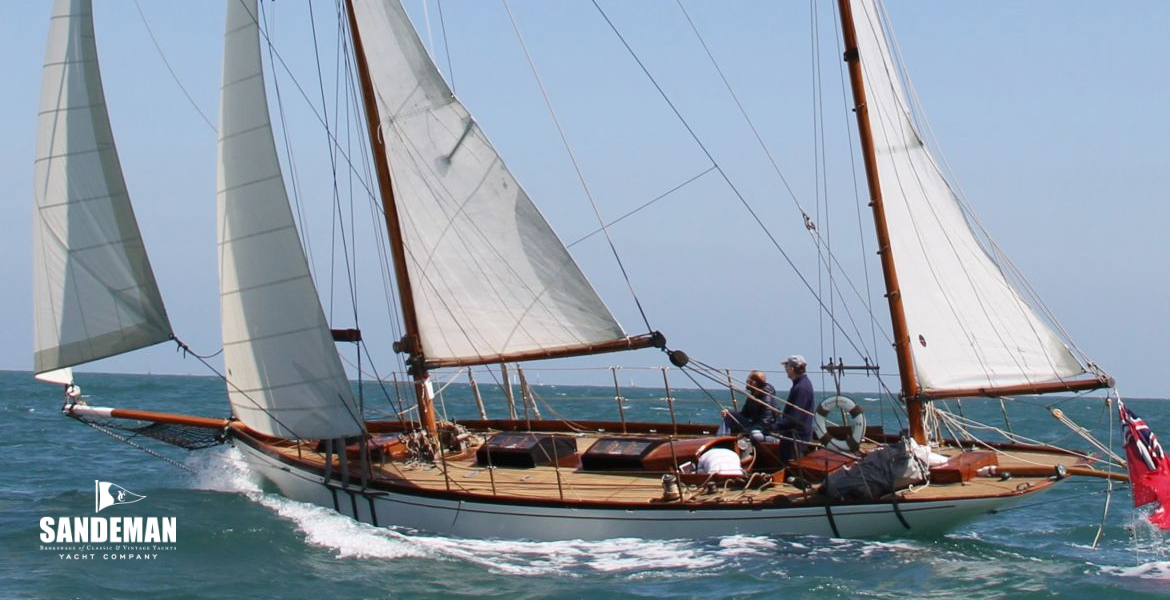
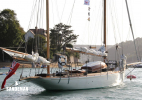
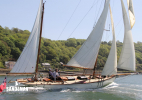
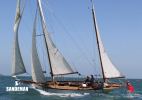
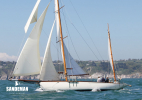
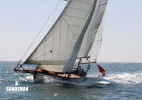
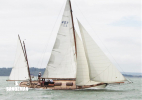
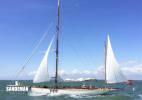
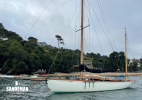
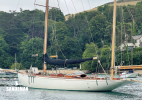
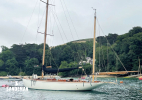
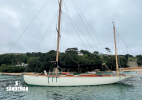
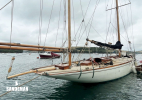
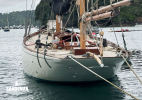
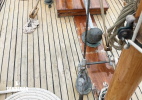
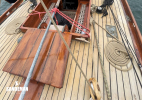
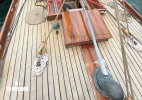
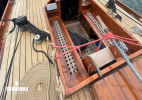
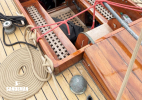
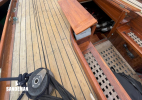
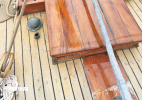
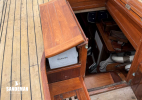
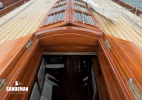
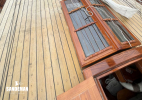
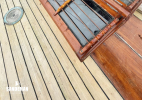
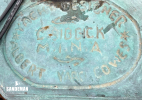
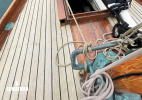
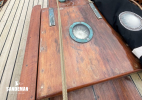
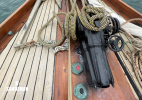
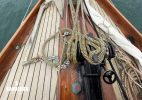
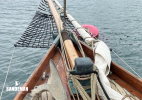
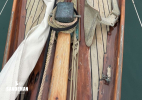
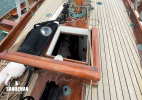
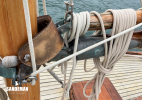
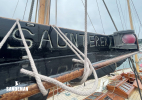
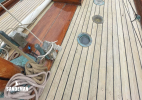
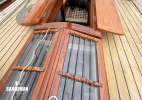
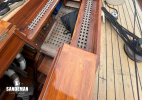
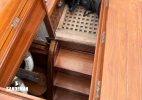
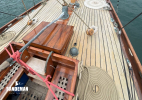
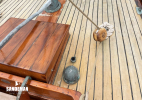
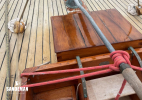
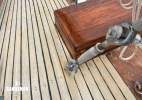
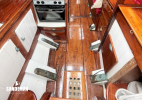
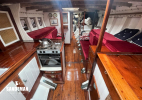
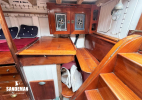
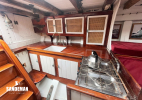
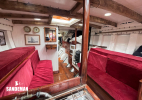
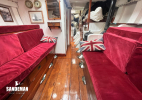
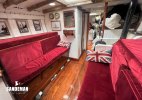
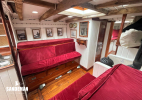
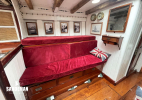
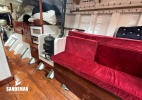
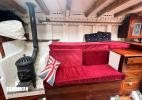
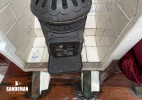
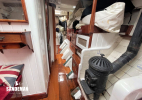
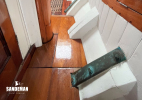
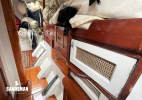
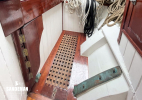
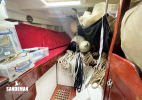
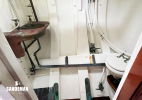
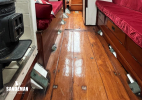
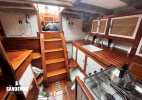
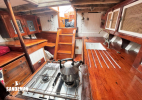
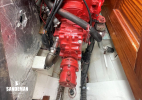
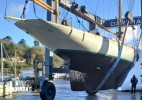
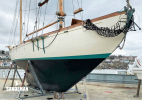
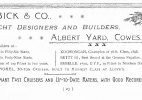
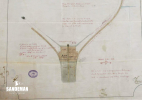
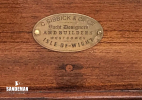
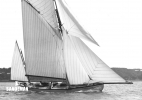
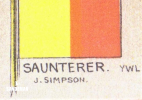
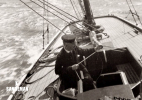
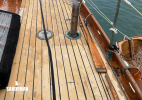
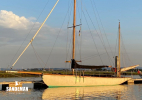
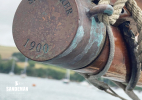
| Designer | Charles Sibbick |
|---|---|
| Builder | C Sibbick & Co, Cowes |
| Date | 2016 |
| Length overall | 60 ft 0 in / 18.3 m |
| Length deck | 47 ft 7 in / 14.5 m |
| Length waterline | 35 ft 5 in / 10.8 m |
|---|---|
| Beam | 10 ft 4 in / 3.15 m |
| Draft | 7 ft 3 in / 2.2 m |
| Displacement | 16 Tonnes |
| Construction | Carvel teak plank on oak frames |
| Engine | Beta 50 HP diesel |
|---|---|
| Location | United Kingdom |
| Price | GBP 275,000 |
These details are provisional and may be amended
SAUNTERER’s understated beauty could easily hide this very English vintage yacht’s easily driven seaworthiness and stout build alongside some of the most slippery racing yachts of their day. SAUNTERER benefits from a current owner who has conscientiously undertaken an important structural refit, helped by people who really understand this vessel: her fabric remains almost 100 percent original; the teak planking and yellow pine deck. This originality can be felt the first time you catch a glimpse of SAUNTERER. Previous owners include Captain Oates of Antarctic fame, and if he were to visit today, he would recognise her immediately: a time machine perhaps, and a sailing machine most definitely!
Interested in SAUNTERER in more detail.
In my time of ownership – only the seventh family to have owned her in 122 years – I have finished the restoration started by my shipwright friend and colleague, Guy Savage, who with his wife, Chloe, saved this vessel and began this work before me, in 2009. Continuing to work with Guy since SAUNTERER came into my ownership, from 2013 onward we have removed every external iron fitting to be replaced in handcrafted bronze, most importantly we have modernised her systems for safety reasons, and we have replaced all her floors and keelbolts, also in bronze - which will allow her wooden hull to survive for at least the next generation. She is immensely strong, with double oak frames pinned together with bronze fastenings. With her wooden keel made from elm and teak, and hull made of lengths of elm below the waterline and teak above – materials almost unobtainable today – and with a yellow pine deck and double oak frames, she is nearly unmatched in durability and strength. And with her bowsprit and mizzen mast lengthened to the 1900 dimensions, and bermudan sail plan fully developed, she has become aesthetically very pleasing indeed. I have been immensely fortunate to have had the opportunity to look after her for over a decade.
2021
- Main and mizzen masts wooded and refinished
2015-2016
- Removed ballast keel (first time in 115 years)
- Renewed floors in way of keel in bronze
- Full inspection of underside of wood keel and hull
- New leather/ tar between lead keel and hull
- Re-attached lead keel with all new bronze bolts
2013-2014
- Replaced and strengthened all chainplates in bronze
- Replaced other major fittings in bronze
- Reinstated original scale gunter rig to mizzen mast and boom
2009-2010
- Hull re-fastening and re-caulking.
- Deck re-paying
- Interior out: restored/ repurposed
- Hull stripped inside and out: cosmetic refinishing
- Spars wooded and re-finished
- Revised companionway hatch
- Fitting restored vintage anchor windlass
- New galley
- New upholstery
- New gas locker
- Rewiring and plumbing
"Messrs. Sibbick & Co. have just launched a very handsome 15-ton cruising yawl. She is flush decked and has good headroom, with cabin accommodation equal to many 25-tonners"
The Yachtsman magazine, April 1900
"Saunterer, a very pretty little yawl... looked a very likely little craft. She raced with her light screens in place, and her lifebuoys lashed in the mizzen rigging."
The Yachtsman magazine, Royal London YC River Matches report, June 1900
The turn of the 19th to 20th centuries were surely vintage years for the building of some very fine yachts. There was an abundance of seasoned timber arriving in Cowes, and the highly skilled craftsmen of the day were eager to give of their best.
In 1900 Charles Sibbick of Cowes designed and built the 16 ton yawl SAUNTERER for retired East India/ tea merchant John Simpson of Hampton Wick on the River Thames. By 1900 Simpson had become such a regular client that one wonders if he was also assisting Sibbick financially. A great supporter of small boat racing through his memberships of Minima Yacht Club, then on the Hamble River, and The Tamesis Club, Simpson raced SAUNTERER in particular at the major Thames Estuary regattas hosted by the Royal Harwich and Royal London Yacht Clubs. Little else is known of her voyaging under Simpson's ownership, but he was also a member of The Cruising Club - later The Royal Cruising Club.
SAUNTERER's strong hull - to Lloyds then highest classification for wood yachts '18A1' - while of fairly heavy oak and teak timbers, has sweet lines enabling a good turn of speed. There was originally no engine, her motive force derived from 1600 sq ft of Ratsey & Lapthorn canvas: gaff rigged including large gaff and jib topsails. Thus she was to remain, entirely unaltered for almost 50 years.
In 1907 she was bought by Captain Lawrence Oates, famously of the ill-fated Scott Antarctic Expedition. We know from Scott's Journal how he entertained the party during the long Antarctic nights with lantern lectures describing his experiences aboard SAUNTERER. The story is well known of the polar party's ordeal on their attempt to return to base and how 'the very gallant gentleman', weak and exhausted, walked out into the blizzard to his death for the sake of his companions. Lawrence’s brother Bryan kept her until 1918.
After the First World War SAUNTERER was bought by one Thomas Belt of Bigg Market, Newcastle-on-Tyne, the proprietor of a rope and canvas business there. Blyth was her home port until 1945 where she established something of a tradition. Some time during the Second World War she was fitted with a Coventry Victor petrol motor.
Post WWII she was owned apparently by three members of the same family: J. Pelham Kayll of Sunderland, Joseph R Kayll, D.S.O., O.B.E., D.F.C., of Co Durham and David P. Kayll, of Bovington Camp, Wareham, Dorset. Among her passages then was a cruise to Norway, after which she took part in the Christiansand race from Blyth. Among the contenders for this arduous race was another Sibbick yacht, THALASSA, almost a sister-ship, but converted to Bermudan rig. Shortly after her return, SAUNTERER was also thus converted to carry 1,060 sq. ft. of canvas.
In 1969 SAUNTERER was acquired by the late Alexander Sutherland based on the Clyde, from where she cruised in most of the waters around Western Europe and Scandinavia. By advantage of the yawl rig to balance her sail area, she has often been sailed smoothly (and very fast) in force 8 or 9 winds without complaint from the crew. In 1977 her ownership passed to Donald A. Sutherland who was to care for her for over thirty years.
She was acquired in 2008 by her previous owners, Guy and Chloe Savage, who undertook between 2009 and 2012 a very significant refitting, which effectively started her restoration without which her journey towards restoration might not have started.
The current owner, for whom (like for many) Captain Oates was a boyhood hero, has since completed her restoration, 2013-2017, and has cruised her along the south coast of UK, continuing to work with Guy Savage to:
- Ensure her final stage of restoration did not remove the “patina of age”
- Restore her original mizzen mast gunter rig
- Eliminate her remaining modern deck fittings
- Remove all possible remaining black iron fittings with bronze replacements
- including all chainplates, goose necks and spreader fittings for both masts (2013)
- and all floors and keel bolts (2016)
- to eliminate rust and any remaining structural weakness
- Reinstate her original 3 x jib fore-triangle
- Maintain her ability to be sailed short-handed, and solo
- Provide up to date safety components including
- complete rewiring, navigation and windex electronic aids
- electric windlass and (below deck) autohelm.
SAUNTERER is now able to be enjoyed again as a classic yacht, with remarkable lines which catch the eye – a vessel which can be recognised as an authentic expression of a pre-WW1 classic cruising yacht, in keeping with her tradition, and in touch with the tenor of her previous owners.
"Material very good throughought. Workmanship excellent."
Lloyd's Surveyor's comments 11 April 1900
- Teak carvel topsides planking
- Elm carvel bottom planking
- Grown sawn double oak frames
- Sawn triple frames at main chainplates
- Bronze clench, dump and screw plank fastenings
- Elm wood keel
- Teak keelson
- Bronze floors fwd mid part of boat supporting the lead keel (2016)
- Wood and galvanised iron floors aft
- 8 Tonnes lead ballast keel
- Bronze ballast keel bolts (2016)
- Teak beam shelves
- Original yellow pine deck
- Tiller steering with tiller fitted directly to rudder head
- (Below deck auto helm)
GENERAL
- Original pine swept deck nibbed to covering boards fwd, tapered aft
- Teak covering boards, king planks and capped bulwarks
- Bronze drop-in stanchions with rope guardrails tensioned fore and aft
- Bronze deck hardware
- Teak deck structures
FROM AFT
- Bumpkin; associated fittings and stays; ash mizzen sheet blocks
- Bronze closed mooring fairleads port and starboard at taffrail
- Associated bronze mooring cleats port and starboard (2014)
- Stern light
- Bronze mushroom vent
- Raised teak hatch (gas locker)
MIZZEN MAST POSITION
- Bronze mushroom vent
- Galvanised mainsheet horse
- Ash mainsheet blocks
- Bronze rudder head
- Galvanised wrought iron tiller
- Raised teak lazarette hatch
- Bronze mushroom vent
- Tufnol runner blocks
COCKPIT
- Self-draining
- Cockpit drains hull valves (2008)
- Raised coamings
- Teak and teak grating benches
- Teak sole grating
- Garmin GPS plotter
- Beta engine panel
- Gull wing hinged companionway hatch lids (2010)
- 2 x Small bronze headsail sheet winches port and starboard
- 2 x Bronze Lewmar 52 ST sheet/ runner winches port and starboard
- Associated teak cleats (2014)
MID DECK
- 1 x Butterfly skylight over companionway/ galley/ chart table
- 1 x Butterfly skylight over saloon (2010)
- 2 x Deck ports port and starboard
- 1 x Opening port in deck to port
- Stove pipe through-deck to starboard
- Provision for tender stowage
MAIN MAST POSITION
- Pinrails port and starboard (2014)
- Bronze plate over partners (2014)
FOREDECK
- Raised forehatch with port
- Lofrans Falkon windlass; horizontal chain gipsy and warping drum
- Vintage bronze windlass also included
- Bronze Samson post
- Douglas fir or similar bowsprit
- Bronze bow rollers port and starboard of stemhead
- Jib furler
GROUND TACKLE
- 60 lb / 27 kg CQR anchor
- c. 46 m ½ in / 12 mm chain
GENERAL
- Accommodation for 5
- Varnished teak sole
- Varnished mahogany and white painted carpentry
- 5 x Steps down from companionway
GALLEY TO PORT
- 'Belfast' sink (2009)
- Bronze mixer tap (2009)
- Food and pot lockers
- 2 x Burner gas hob with oven
- 3 x Deckhead lights
CHART TABLE TO STARBOARD
- Beta engine instrumentation
- Navigation displays
- VHF Radio
- Battery monitor
- 2 x Bulkhead lights
SALOON
- Settee berth to port
- Stowage under
- Settee to starboard
- Stowage under
- Pilot berths port and starboard
- Traditional teak gimballed drop leaf table offset to starboard
- Norrahammar cast iron vintage solid fuel stove in tiled recess
- 4 x Deckhead lights
PASSAGE FORWARD OFFSET TO STARBOARD
- WC Compartment to port
- Passage berth to starboard
- Drawers and lockers under
WC/ SHOWER COMPARTMENT
- Baby Blake sea toilet
- Shower head (2015)
- Washbasin with mixer tap (2015)
- Hanging locker
- Port light and opening port in deckhead
FORE CABIN
- Double berth to port
- Sail bin to starboard
- 2 x Bulkhead lights
- Access forward to chain locker
RIG
- Bermudan yawl rig
- All spars in varnished Douglas fir or similar
- Solid main mast (1947)
- Merriman and Knowsley bronze halyard winches
- Galvanised standing rigging (2009 resloshed 2021)
- Running rigging and Dynema backstays (2010 and 2014)
- Jib sheets (2017)
SAILS
- Slab reefing mainsail (2007)
- No 1 Jib (2008)
- Small 'Blade' staysail (2011)
- Furling jib (2017)
- Reaching staysail (2017)
- Flying jib (2017)
CANVASWORK
- Boom covers for main and mizzen
- Covers for hatches and cockpit
MECHANICAL
- Beta 50 HP diesel with V drive gearbox
- Refurbished 2008 and 2016
- Engine beds replaced in bronze 2016
- Under 400 hours use
- Racor fuel filter
- Bronze cooling water strainer
- Stainless steel propeller shaft (2008)
- Cutlass bearing (2008)
- Fixed 3-blade aperture bronze propeller (2010)
ELECTRICAL
- Engine mounted alternator
- 4 x 110 Ah sealed lead acid batteries (2022)
- Shore power system for 240 V ring main
- Sterling battery charger (2010)
- 12 V circuit wiring renewed throughout boat 2009-10 / 2015-2016
- Circuit breaker panel for distribution (rewired 2016)
- Interior lighting 12 V and 24 V
TANKAGE
- Hot water calorifier
- Plastic fuel tank; copper / BS7840 flexible Hoses (2008)
- 105 L Diesel capacity
- Plastic water tank and hoses (2008)
- 90 L Fresh water capacity
- Fresh water pump (2010)
NAVIGATION
All Garmin (2020)
- 700 touch screen plotter (2020)
- GPS
- Fish finder
- Sonar (2010)
- Log and transducer (2010)
- GHC20 auto pilot
- Garmin windex
- AIS
COMMUNICATIONS
- ICOM VHF Radio
- Traditional liferings
- Electric bilge pumps (2010)
- Lifelines
- Original boarding ladder
- 1 x Drying out leg
- Mast trestles
- Jib boom
- 2009 Mizzen spars, standing rigging and sail
- Spare shorter bowsprit
- Historical records and drawings
- Fenders
- Warps
Not included but available by negotiation
- J.E. Stone of East Portlemouth clinker pram tender
Contact us to discuss SAUNTERER in more detail.
These particulars have been prepared from information provided by the vendors and are intended as a general guide. The purchaser should confirm details of concern to them by survey or engineers inspection. The purchaser should also ensure that the purchase contract properly reflects their concerns and specifies details on which they wish to rely.